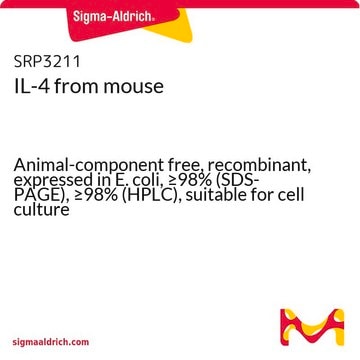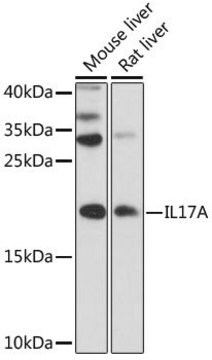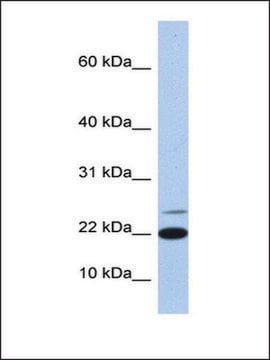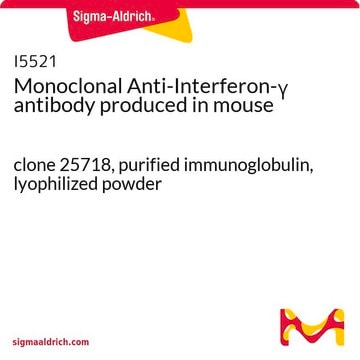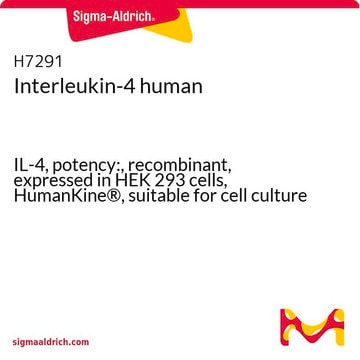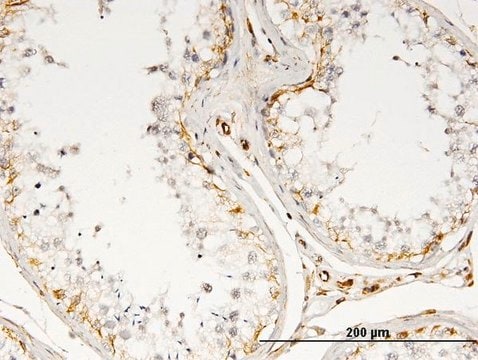I7034
Monoclonal Anti-Interleukin-4 antibody produced in mouse
clone 3007, purified immunoglobulin, lyophilized powder
Synonym(s):
Anti-IL-4
Sign Into View Organizational & Contract Pricing
All Photos(1)
About This Item
Recommended Products
biological source
mouse
Quality Level
conjugate
unconjugated
antibody form
purified immunoglobulin
antibody product type
primary antibodies
clone
3007, monoclonal
form
lyophilized powder
species reactivity
human
technique(s)
immunohistochemistry: 5-15.0 μg/mL
neutralization: suitable
western blot: 1-2 μg/mL
isotype
IgG1
UniProt accession no.
storage temp.
−20°C
Gene Information
human ... IL4(3565)
Looking for similar products? Visit Product Comparison Guide
General description
Interleukin-4 (IL-4) is a T cell derived chemokine that stimulates the Th2 mediated immune response and proliferation of B cells. The effects of IL-4 are mediated by two types of receptors, type I receptor consisting of IL-4Rα and common γ chain and type II receptor composed of IL-4Rα and IL-13Rα1. The signalling stimulated by IL-4 leads to activation of JAK/STAT6 and IRS-mediated PI3K/Akt pathway. Through these pathways, IL-4 is responsible for endocytic activity of macrophages, chemotaxis of leukocytes in response to inflammation, angiogenesis and regulation of nitric oxide metabolism in macrophages. Anti-tumor effects of IL-4 have been reported in cancers of breast, liver and renal cells
Anti-Interleukin-4 specifically recognizes human interleukin-4 (12-20 kDa). It does not react with mouse IL-4.
Anti-Interleukin-4 specifically recognizes human interleukin-4 (12-20 kDa). It does not react with mouse IL-4.
Immunogen
purified, E. coli-derived recombinant human interleukin-4.
Application
Anti-Interleukin-4 antibody may be used for immunoblotting at a working concentration of 1-2 μg/ml. For immunohistochemistry, a working concentration of 15 μg/ml may be used for human tissues and 5-15 μg/ml may be used for human cells. The antibody is suitable for neutralization reactions.
Physical form
Lyophilized from 0.2 μm-filtered solution in phosphate buffered saline containing carbohydrates.
Disclaimer
Unless otherwise stated in our catalog or other company documentation accompanying the product(s), our products are intended for research use only and are not to be used for any other purpose, which includes but is not limited to, unauthorized commercial uses, in vitro diagnostic uses, ex vivo or in vivo therapeutic uses or any type of consumption or application to humans or animals.
Not finding the right product?
Try our Product Selector Tool.
related product
Product No.
Description
Pricing
Storage Class Code
13 - Non Combustible Solids
WGK
WGK 1
Flash Point(F)
Not applicable
Flash Point(C)
Not applicable
Personal Protective Equipment
dust mask type N95 (US), Eyeshields, Gloves
Choose from one of the most recent versions:
Already Own This Product?
Find documentation for the products that you have recently purchased in the Document Library.
Barbara Świerczek-Lasek et al.
International journal of molecular sciences, 20(16) (2019-08-16)
Pluripotent stem cells convert into skeletal muscle tissue during teratoma formation or chimeric animal development. Thus, they are characterized by naive myogenic potential. Numerous attempts have been made to develop protocols enabling efficient and safe conversion of pluripotent stem cells
M Stein et al.
The Journal of experimental medicine, 176(1), 287-292 (1992-07-01)
Expression of the macrophage mannose receptor is inhibited by interferon gamma (IFN-gamma), a T helper type 1 (Th-1)-derived lymphokine. Interleukin 4 (IL-4), a Th-2 lymphocyte product, upregulates major histocompatibility class II antigen expression but inhibits inflammatory cytokine production by macrophages.
C K Oh et al.
European respiratory review : an official journal of the European Respiratory Society, 19(115), 46-54 (2010-10-20)
Asthma is a complex, persistent, inflammatory disease characterised by airway hyperresponsiveness in association with airway inflammation. Studies suggest that regular use of high-dose inhaled corticosteroids and long-acting bronchodilators or omalizumab (a humanised monoclonal antibody that binds to immunoglobulin E and
Hao-Wei Wang et al.
Cell cycle (Georgetown, Tex.), 9(24), 4824-4835 (2010-12-15)
Although macrophages were originally recognized as major immune effector cells, it is now appreciated that they also play many important roles in the maintenance of tissue homeostasis, and are involved in a variety of pathological conditions including cancer. Several studies
Jane Gilmour et al.
Immunology, 124(4), 437-444 (2008-05-16)
The mechanism of differentiation of naïve T cells to a variety of effector lineages, but particularly to T helper type 1 (Th1) and Th2 cells, has been the subject of intense scrutiny over the past two decades. Studies have revealed
Our team of scientists has experience in all areas of research including Life Science, Material Science, Chemical Synthesis, Chromatography, Analytical and many others.
Contact Technical Service